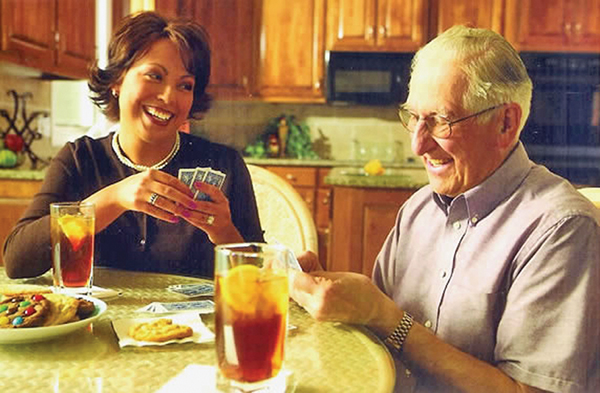
48,000 people are suffering with dementia in this country and that number is rising on an annual basis. One reason for this is that we are living longer as a population and the risk factors increase with age.
Dementia is an umbrella term used to describe a range of approximately 100 diseases, including Alzheimer’s, and progressively effects cognitive abilities and behaviours. For those who are caring for loved ones with the condition, it can be a huge challenge, taking an emotional and physical toll.
Nurse and family therapist with Home Instead, Bernie Byrne, spoke at one of their monthly workshops aimed at giving support to caregivers. “Share the care. This is very important, as otherwise the carer may become depressed, and if something were to happen to them there wouldn’t be anyone capable of intervening.”
The workshop outlines in simple terms, ways of dealing with a very complex illness, the ripples of which effect more than the sufferer. Touching on family dynamics, Byrne advocates a rota system of care, saying of this, “Don’t tell me what you can’t do, tell me what you can do.”
Other tips of importance are positive reinforcement. “Although there are certain behaviours that need to be managed that may put themselves or others in danger, I would recommend positive reinforcement and building of self worth. Don’t correct as this will cause them to withdraw,” said Byrne.
She also spoke about needing to become a “detective” and letting your knowledge of the person you knew before the illness inform you on how to communicate with them now. She gave some comprehensive examples of this. “Words form a small percentage of how we communicate, and dementia sufferers are extremely perceptive. Loved ones will pick up on our tone of voice and body language.”
A way of understanding the progression of the illness could be to think of maturing backwards, and cognitive abilities reversing with time, though Byrne stresses that it is wrong to treat a sufferer like a child. “Your loved one needs to be treated with dignity at all times. The person you know is still in there. You just now need to find new ways of accessing them. A life journal is a really useful tool for this.”
A diagnosis of this kind can feel devastating for all involved but through acceptance and care there is hope, and a very good quality of life can be achieved. A short video illustrated how, contrary to appearances, by tapping into past loves, the person shows that he really is “alive inside”. It is also advisable to keep an easily accessible contact sheet within the home.
The importance of minding yourself as a carer cannot be underestimated and the information booklet Running on Empty is available from the Home Instead website.
There are several aids in the form of apps, GPS systems and booklets available for families of dementia sufferers. For more information, or to attend a workshop see www.homeinstead.ie/dublin-ballsbridge or telephone 01 667 0911.
By Maria Shields O’Kelly

